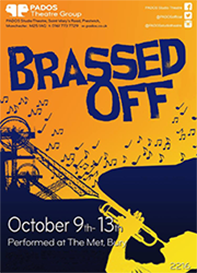Association of Community Theatre

BRASSED OFF
by Paul Allen, adapted from the screenplay by Paul Hermon
P.A.D.O.S.
 The was another ambitious production for your company to get its teeth into, with more fond memories for the future when someone starts a conversation with, “D’you remember when we did … ?
The was another ambitious production for your company to get its teeth into, with more fond memories for the future when someone starts a conversation with, “D’you remember when we did … ?
The play based on the 1996 film by Paul Hermon about a colliery brass band, and real events in the West Yorkshire village of Grimethorpe following on from the 1984 miner’s strike. In the play, the miners who stood firm thoroughout the strike, now faced a redundancy ballot that threatens with extinction both their livelihoods and a century of brass band tradition. It was a time when successive Conservative governments “ripped out the hearts of communities in the North of England and in Wales, and then came back for their souls.” A report in the early 1990s classed Grimethorpe as the most deprived village in the country, so the colliery brass band’s triumph in the National championship within a week of the pit closing, was “of the stuff that dreams are made on”, as well as being actually true. This is the story you had chosen to tell us, with all its stirring emotional music, its earthy humour, its rugged language and its heart-rending drama. It was a brave choice.
Your set was an all-purpose one, cleverly designed and constructed with the constraints of the Met in mind, and realistically presented and used. The pit exterior was CS with mine shaft and wheel with attendant platform, steps, handrail and walkways. It was situated near to Buckley Street with suggestions of miners’ homes and SR was used at different times to be Phil and Sandra’s living room, and the hospital. The main stage covered most of the remaining actions and congratulations are due to the team who created it within the limited constrictions available, enabling the company to achieve what resulted.
There was another multiple cast member without whom this story could not have been adequately told – the Whitworth Vale and Healey Brass Band. Their expert playing and artistry reached deeply into the audience emotions, underlined the hardships of the story and were an inspiration for the cast. Whether rehearsing on stage, marching down the steep steps through the audience, becoming increasing inebriated at the show where they were supposed to be playing, or weaving magic with the “The Floral Dance,” “Danny Boy.” “Land of Hope and Glory” and Rodrigo’s “Concierto de Aranjuez”. They combined, with everyone else involved in any way, to make the evening both memorable and a memory for all who shared in it
Mark Rosenthal, your director, didn’t let the story down by including too much sentimentality, in fact, his cast acted out the hardships, dilemmas as to their family futures and fortunes as real life experiences. It was that sort of story, and they owed it to history. We saw workmates being physically violent to each other, not withstanding years of friendship; the desperate shortage of money creating serious family problems at a time of untold pressure which led to attempted suicide, and yet, ever present was the legendary spirit of humour from the miners in the bleakest of times. The fabled honesty between miners and their wives is told with shattering clarity despite breaking point being reached over the cost of band subscriptions and the price of new instruments, when the bailiffs came to call. Mark welded together the many fundamental differences which are collectively known as “real life” and his cast became people trying desperately to do their best for family, friend, honour, tradition, and life generally in a moment of history. Hearts were on view on your stage and invisible, but nevertheless there throughout your theatre.
Stuart Forbes played Danny, the band master, who became increasingly ill throughout the play, eventually collapsing and being taken to hospital. His life revolved around the band, and his drive, standards, musical skill and heart made them what they became. His impassioned refusal to accept the trophy – the National Championship, - was a moving piece.
Paul Dawson played his son Phil, who played in the band. The pressures and failures of this agonising time affected him deeply, and the consequent disintegrating home life ended with his wife, Sandra, leaving him and taking the children. His attempt to hang himself from the pit shaft, and his speech justifying it, were moments of pure drama. He had reached the end and the children’s entertainers costume he was wearing seemed to emphasize his hopelessness, as did the new instrument he carried when visiting his father in hospital.
Sara Brockway, was Phil’s wife, Sandra, and she showed desperate honesty, the hopelessness she was brought to. Her entire life seemed doomed, exacerbated by the arrival of the bailiffs. Elliot Mills played their son, Shane, and the sun seemed to shine whenever he was on stage, so full of energy and enthusiasm. He seemed to enjoy thoroughly conducting the band – shades of his grandfather – and so did we. The bond between grandfather and grandson was well depicted and we could sense how Danny felt when he realised Shane had taken the baton.
Mike Salmon, as Harry, Keith McEvoy, as Jim and Debbie Lewis and Angela Grady as their wives, Vera and Rita, gave experience and joyous, infectious humour to their characterisations and kept the story fizzing along on their strengths whenever they were involved. Whether drunk or sober, angry or politically concerned, having fun or emotionally affected, they gave power to the story.
Hannah Binns played Gloria, who auditioned successfully to play in the band, and her blossoming affair with Andy, played by Gavin Stamper, was well timed and realistically developed by both. The fact that Gloria worked for the Coal Board became a problem for Andy and some band members, was reconciled when the band won its much heralded trophy, and we literally heaved a sigh of relief. Her actual playing of Rodrigo’s “Concierto de Aranjuez” was one of the evening’s highlights.
Rob Livesey, Michael Mills, Katie Seddon and Rayna Jay Elms added their talents to the production proving yet again that there are no small parts in theatre.
Well done to Mark, the “Grimley Colliery Band”, and everyone involved in any way in this remarkable evening.
Happy playmaking. Many thanks for your welcome and hospitality.